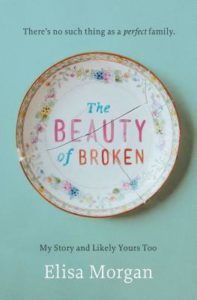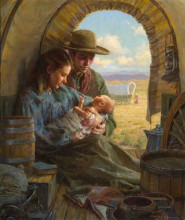
The War of Words
In this Adventures in Odyssey drama, a carelessly uttered word from Eugene creates havoc as it becomes the fashionable insult, resulting in a lesson about the power of words.
Home » Episodes » Focus on the Family Broadcast » Forging a Partnership With Your Spouse in a Family Crisis
Excerpt:
Mrs. Elisa Morgan: We like to, like, suck out all of the – the icky parts of life in Christianity, and the reality is, is that God embraces and joins us in the icky parts, in the here.
End of Excerpt
John Fuller: Well, that is so true, and we’re going to be talking specifically about keeping your marriage strong when life is hard. This is Focus on the Family. Thanks for joining us. Your host is Focus president and author, Jim Daly. And I’m John Fuller.
Jim Daly: John, when life is especially difficult, as it’s been this year, it’s easy to let our marriages be the first thing that start to slip. Sometimes that looks like letting our relationship with our spouse to go on autopilot and at other times, we can even start to turn against our husband or wife in the midst of all the stress.
John: Yeah, that stress really puts pressure on the relationship. Um, I really appreciate – and I think we quoted this in our marriage – the verse in Ecclesiastes 4 that says, “Two are better than one. If either falls down, one can help the other one up.”
Jim: Right. And I’m sure your marriage isn’t perfect. But let me encourage you, when things get hard, don’t back away. Instead, lean in to your relationship. As you’ll hear in the story we’re sharing today, if you hold tight to your faith in God, a crisis can actually make your marriage stronger than ever.
John: Yeah. Today we have a conversation that we enjoyed with Elisa and Evan Morgan. Elisa has been on the broadcast a number of times. This was the first time, though, that her husband Evan joined us. Uh, they’ve been married over 40 years, and have two adult children and two grandchildren. And Elisa has written about their journey together in her book The Beauty of Broken: My Story and Likely Yours Too. We’ve got copies of that book, along with information about our free counseling services, at focusonthefamily.com/broadcast. Let’s go ahead and listen in now to our recorded conversation with Elisa and Evan Morgan on Focus on the Family.
Jim: Elisa, welcome back to Focus. And Evan – first time.
Mr. Evan Morgan: Yes. Glad to do it.
Jim: So, we want your perspective today.
Evan: (Laughter) Okay.
Jim: (Laughter).
Elisa: Yeah, if you could – if you can get a word in, right? I…
(LAUGHTER)
Jim: Well, no. That’ll be the challenge, but it’s every man’s challenge.
(LAUGHTER)
Elisa: Yeah, it is. It is. I’m so glad he’s here.
Jim: I’m teasing.
Elisa: No, I really am so glad he’s here because in telling this story, he is integral to the whole thing, so…
Jim: Yeah. You know, I want to start here, Elisa, because there’s a great Scripture that both you and I speak at different venues. And this one really spiritually gets me because, uh, it’s there in Psalms. And it says, “He’s close” – meaning God – “He’s close to the brokenhearted and saves those crushed in spirit.” And it resonates with your title of your book, The Beauty of Broken. I guess the question starting here is, why is brokenness part of our experience? It’s that infinite question. If God is so loving and kind, why does He want us to be broken?
Elisa: It’s so hard. And going through it, it’s almost impossible to understand how our loving God can allow pain in our lives. Getting beyond it, it makes a little bit more sense. But what I’ve experienced is that I – I have had a kind of an idealism about walking with God, that if I just knew Jesus, you know, I’d have the answer to doing life in a better way. And the reality is that when we know Jesus, we’re invited into a journey where He lovingly pulls us towards Himself, but that means that things around us and ourselves as well may break. He himself broke.
Jim: Yeah.
Elisa: …That He might be in an intimate relationship with us.
Jim: Right. Think of that and His anguish on the cross with His Father…
Elisa: Yeah.
Jim: You know?
Elisa: It’s huge. I mean, I actually think about Isaiah 53 – I think it’s verse 5 – “By His wounds, we’re healed.”
Jim: Yeah.
Elisa: And that really means black-and-blue marks. That – that’s broken blood vessels. We – we like to, like, suck out all of the – the icky parts of life in Christianity, and the reality is, is that God embraces and joins us…
Jim: Yeah.
Elisa: …In the icky parts, in the here.
Jim: Yeah. I so appreciate, I guess, what we might call the meta-narrative there. And I feel like it’s a good place to start in terms of that question. But rolling back now, let’s go back to that college class when you two met. (Laughter) And this is so funny. I love this because you’re trying to concentrate.
Elisa: I’m trying to concentrate.
Jim: And Evan, who you don’t even know…
Elisa: Who I don’t know.
Jim: …Is interrupting you. So, what happened?
John: (Laughter).
Elisa: So annoying.
Evan: Yeah. I hadn’t heard of the book Boundaries yet, I don’t think.
(LAUGHTER)
Jim: Well, it sounded like she caught your eye. So, most guys would say…
Evan: Oh, yeah.
Jim: …You throw boundaries out there at that point.
Evan: It was actually a seminary class, and there weren’t a lot of women in this place. And, uh, an Old Testament class is how we met.
Jim: (Laughter).
Evan: So, I spied this cute girl sitting there. And I thought, “Wow. There’s a chair next to her.”
(LAUGHTER)
Evan: Sure enough, she didn’t want to be interrupted, though, ’cause she was studying for Greek.
Elisa: Yeah. And that take…
Jim: Studying Greek…
Elisa: That – it took…
Jim: That’s not a time to interrupt.
Evan: (Laughter) Right.
Elisa: It took a lot of concentration for me, yeah.
Jim: So, what happened? What was that transaction like, the first one?
Evan: Well, as Elisa writes in the book, I literally asked her about four questions, and I got one-word answers. And she wouldn’t even look at me.
Elisa: (Laughter)
Evan: And I’m thinking, “Oh, okay. This is a dead end.” But…
(LAUGHTER)
Evan: Finally, she looked up, and we just connected. And, uh, that was the beginning.
Jim: Your eyes met.
Evan: We – eyes met.
Elisa: Oh, let me…
Evan: There was music. There was doves. It was everything (laughter).
Elisa: Let me translate. I went, “Shazam.”
(LAUGHTER)
Jim: Should’ve looked up sooner.
Elisa: Yeah.
Evan: She had eyesight problems at the time.
(LAUGHTER)
Jim: That’s so cute.
Evan: But, uh, that was the beginning. And we started dating. And we were – we were engaged three months later.
Jim: Man, that is – that is pretty quick.
Elisa: It was fast.
Jim: But that’s what Greek will do for you.
(LAUGHTER)
Elisa: Any – anything but Greek, right?
Jim: I hope you meet in the Greek class. Hey, uh, you know, that moment – it’s so fun to talk to newlyweds or engaged couples ’cause there’s so much enthusiasm. And, you know, after you’re married a few years, that enthusiasm can roll over. But, um, how do we keep healthy enthusiasm going? Because all the science – and there’s biological science that supports this. Infatuation, that googly eyed thing, whatever you want to call it, the tingles – I mean, that kind of lasts a year or two with marriage, and then that can begin to fade. What needs to replace that? And what does it look like?
Elisa: Yeah. I think everybody’s different. Every relationship and marriage is different. For us, it has been doing life together. And by that, I do not mean playing golf together.
(LAUGHTER)
Jim: I know you’re a golfer.
Evan: I’m so sad about that.
(LAUGHTER)
Elisa: But what I mean is really caring about where each other is invested and joining them there. So, I mean, we talk every day. Even in all the years where maybe one of us has been traveling or one of us has been focused in or out of the home, we talk every day.
Jim: Now, you said that like a surprise. Um, is that normal, or do many couples not talk?
Elisa: I’m not living in everybody else’s house…
Jim: (Laughter).
Elisa: …So I don’t actually know, but…
Jim: Well, but being the president of MOPS for many years…
Elisa: Yeah.
Jim: …You’ve heard from women who were lonely.
Elisa: I – I think we blow intimacy up into this googly eyed thing. And I guess the point that I’m trying to make is that just talking counts. That is a…
Jim: Right.
Elisa: …Real way to stay connected because when Evan’s sharing with me what he’s really going through and I’m sharing what I’m really going through, that’s intimacy.
Jim: Yeah.
Elisa: That really is the whole thing.
Jim: You know, something that caught me, Evan. And I wanted your perspective. You were the CFO, I think, of a university.
Evan: Uh, Denver Seminary, right. Uh-huh. Uh-huh.
Jim: Denver Seminary – so not only did you meet your wife there in Greek, you became the CFO of that same university…
Evan: Right, right.
Jim: …Same seminary. That’s pretty funny actually.
(LAUGHTER)
Jim: But – and I don’t mean this in a negative way. But being a CFO, you’re – it sounds like you’re a numbers guy. Uh, you can be probably pretty compartmentalized – what a lot of us men suffer from. And you go about your day. And I’ll tell you, “I love you,” you know, 14 times, but you’re not getting 15 out of me.
Evan: (Laughter).
Jim: I’m being…
Evan: Yeah. Right.
Jim: But how do you combat that as a compartmentalized male? How do you step out and say, “Okay. I need this – I need to talk to Elisa”? I mean, you’re talking to a lot of guys that are connecting with what I’m saying. They’re going, “That’s me.”
Evan: Yeah. And I think when – when we were going through a lot of the crisis that we were going through, that part of my personality – the organized – my dad was an engineer, civil engineer. And so, I kind of…
Jim: It’s not an excuse.
Evan: …Have that in the DNA. No, it’s just – but I – I – that helped in terms of the organizational side. But the intimacy side comes often through going through these struggles that we come together. And it’s a different type of intimacy than maybe people think about. But there is a sense in which we cannot survive this unless we’re hand-in-hand and determining. And that means a lot of communication, too. And…
Jim: Well, yeah. Communication – I guess that’s the critical point. And I think, uh, for men and what – what is really good for women to hear is it can be both your strength – those qualities that he possesses, that steadfastness – but then, also, that – “Communicate with me. Talk to me.” And so many women are longing for both. But men struggle to deliver on that second intimacy level of, “Talk with me. Just don’t be my rock.”
Evan: Right.
Jim: Um, “Speak to my heart.”
Evan: And it’s easy to retreat, I think, that way, too – is just say, “Well, you’ve got it covered, and you’re the communicator. And so, I can just retreat and allow you…”
Jim: Yeah.
Evan: “…To handle some of this.” And I think that’s a sign.
Jim: Well, and, again, we haven’t even really unfolded the story. So, let’s go there, Elisa. Speak to your family of origin, those things that were so difficult, what you talk about in your great book The Beauty of Broken. Give us that picture.
Elisa: Sure. I come from a broken family. My parents were divorced when I was 5. And then later, as I grew up in a single-mom family, I realized my mom was broken through alcoholism – so broken through divorce, broken through alcoholism. And for me, when I found out that Jesus loved me, I was – I glommed on to that in such a tangible way. I thought…
Jim: How old were you when that…
Elisa: Well, I kind of knew God growing up because my mom would drop us off at church. She was so super smart. She’d had two hours free as a single mom.
Jim: Why do most of our parents – we have that story?
Elisa: (Laughter).
Jim: They didn’t go.
Elisa: I love it.
Jim: But they would drop – that’s Jean, my wife.
Elisa: That’s genius.
Jim: That’s her story, too.
Evan: (Laughter).
Elisa: Genius. But anyway, so I grew up kind of knowing God, but then I discovered Him differently as a teen. I discovered Jesus as a teen, actually through the ministry of Young Life.
Jim: Yeah.
Elisa: And when I found out that Jesus was really the real deal, I thought, “Well, now I’ve got every answer I could ever want.” Um, I may have come from a broken family, but I determined I was going to build a perfectly intact second family.
Jim: Okay. So, that was your goal.
Elisa: That was my goal.
Jim: And Evan, you’re coming from kind of a bit of an opposite. But I – you know, when I speak, I’ll often ask the audience, “Anybody from a perfect family?”
(LAUGHTER)
Elisa: Yup.
Jim: I haven’t seen a hand go up. Actually, one time I did.
Elisa: Oh, my.
Jim: And I said, “But you’ve got to have an uncle.” And the hand went down.
(LAUGHTER)
Evan: That’s good. That’s good.
Jim: But, you know, you were perhaps healthier. But describe your growing-up years.
Evan: And it was. We’re opposite ends, potentially, as I grew up in a Christian home. And, uh, I say that – kiddingly say that I had my Christianity with my oatmeal.
Jim: (Laughter) That’s funny.
Evan: You know, we just – that was part of the family dynamic. But like most, my dad was a military guy, lieutenant colonel, engineer, as I mentioned. And so, things were just kind of regimented around the house, not a lot of times that I can recall – maybe not even one – of a really close father-son, kind of, uh, relationship and mentoring or wisdom. And so, I later developed relationships with two other men that just became very instrumental to me. But that was – that was a different side. So, we meet this, and we’re like, “Whoa,” you know, in the first couple of years of marriage.
Jim: Yeah.
Evan: And we quickly said, “You know, we ought to just get therapy and figure out how to do this and try to navigate this.”
Elisa: Because we were so different, you’re talking about?
Evan: Yeah.
Jim: Yeah.
Evan: Because the differences.
Jim: So, those are the clash points. Yeah. Describe that – uh, the first couple of years. What were some of those friction points that you encountered?
Elisa: Well, there – several of them. I mean, I was not a, quote, “typical stay-at-home mom.” Well, let’s back up. We knew we couldn’t have children biologically.
Jim: Okay.
Evan: Right. Right.
Jim: You know, in the book, you painted this picture so well. And, emotionally, it really caught my attention, where you get married, and you set up the nursery, thinking adoption would be quick and right there. And years – you know, three, four, five years go by.
Elisa: I say it’s like being dilated to 9 for, like, five years.
Jim: Right. I mean that…
Elisa: (Laughter) Yeah. Ouch. Yeah. Yeah.
Jim: And the dust collecting in the nursery.
Elisa: Yeah. It’s so painful.
Jim: And Elisa, I mean, there are women hearing this, and they’re starting to tear up because they are living it or…
Elisa: Ugh. Yes.
Jim: …They just lived it.
Elisa: Every Mother’s Day goes by and…
Jim: So, speak to that emotion and what you were going through and then the joy that, okay, something happened.
Elisa: Right. So, we are waiting for children, and I’m working full time. I’m a dean of women at a Bible college. Evan is CFO of a seminary.
Jim: You guys are high achievers.
Elisa: We’re high achievers.
Jim: This is in your 20s?
Elisa: We’re high achievers.
Jim: Yeah.
Elisa: That’s part of this story, too. And so, you know, we are waiting and waiting and waiting. And truly, as I waited and waited, I had this idea I was going to give the child the perfect family. Evan had this idea for different reasons. And I had the sense, as I was praying one night, that God was saying to me, “Elisa, by the time, this baby – whoever it is – is going to be placed in your arms, he or she will already have experienced the greatest wound of their life.”
Jim: Yeah.
Elisa: And I’m like, “What? I can make up for that.” You know, it’s what I’m thinking inside myself.
Jim: Yeah.
Elisa: I truly didn’t understand that. But what – where – story is that around – after about five years of marriage, we do become parents, first of a little baby girl, who was just, you know, 3-weeks-old, and then a little baby boy two years later, who was an infant, as well. And we parented joyously with Jesus all over it for many years. And then in the teen years, we watched our family fall and break. And that’s what Evan’s talking about, too, about the, “Whoa.” We had to figure this out – fall and break in ways that stunned us.
Jim: Yeah. And we want to, you know, get into that. There’s, again, so many people – and I appreciate your vulnerability. That’s one of your great qualities, both as a couple, but Elisa, running MOPS – that’s what I think endeared people to your leadership, especially the women that we’re feeling or going through things like you’ve gone through.
Elisa: Well, none of us know what we’re doing as parents.
Jim: (Laughter) Right.
Elisa: And we always think the other person does. And God gives babies every time to people who’ve never been parents before. I don’t know what He’s thinking (laughter).
Jim: Correct – and so, again, I think you can feel these words going out through the podcasts, through the radio program. People are going be touched. And people are living in that space. So, your daughter’s 16. What happened?
Elisa: Well, it was a really weird series of events. Um, she was this beautiful, 5-foot-7, state-ranked swimmer who had just returned from a – a missions trip with church to serve HIV/AIDS orphans in Kenya.
Jim: Check that – everything working well.
Elisa: Looking really good.
Jim: Mom and Dad doing good.
Elisa: We’re awesome.
Evan: Still on the perfect track.
Jim: Got it.
(LAUGHTER)
Elisa: We’re awesome.
Jim: And I can feel it. I mean, we feel like that with our boys. I get it.
Elisa: Yeah. And legitimately proud, you know?
Jim: Yeah.
Elisa: I’m not trying to…
Jim: Honor-roll student, I believe, and your…
Elisa: Close (laughter).
Jim: Okay. Good.
Elisa: Yeah, doing really good. And I had – actually had a dream. And in the dream – really weird – I was in a home that was under construction. And I was walking through it, and Jesus was my tour guide. He had a little hard hat on. It was bizarre. And He stopped at these two rooms that were adjacent to each other. And He goes to, “Elisa, this one’s for your daughter. And this one’s for the baby.” And I went, “What?” And I woke up, and I shook that puppy off. But I’m not kidding. A couple of nights later, the dream repeated itself – this home…
Jim: Oh, my goodness.
Elisa: …Under construction and scaffolding. Same thing – “This room’s for your daughter. This room’s for the baby.” And a few days later, I’m at MOPS around a conference table. And this group of people is planning the future of what would be called Teen MOPS, for teenagers who were becoming pregnant. And I sense the Holy Spirit saying to me, “Elisa, you’re gonna know more about this than anybody in the room.”
Jim: Wow.
Elisa: I am like, “What?” And I go home. And I ask my beautiful daughter, “Is there any way you could be pregnant?” And she nods. And I went and got a pregnancy test – me, never-before-pregnant me. I went to the store and got one. And I stood outside the bathroom door while my daughter peed on a stick and found out, yes, she’s pregnant. And Evan is traveling. And I call my dear, precious husband and tell him. It’s news we never, ever, ever dreamed we would hear. And I’m president of MOPS in the process.
Jim: Well, that whole connection – I mean, that’s what’s difficult. It’s the image. It’s, what will people think? Not that you – you – I don’t feel like you’re a person that puts too much weight on that. But it’s still real.
Elisa: Everybody does, though.
Jim: Yeah.
Elisa: Everybody does. You get up in front of people – and I never did pretend, as you’re saying, Jim, that I had it all together. I – God called me onto a platform of vulnerability, going, “I don’t know what the poop I’m doing either.”
Jim: (Laughter) Right.
Elisa: “Let’s figure it out together.” But there is a huge shame. And, for me, being sandwiched between my mom, who had so many struggles, and then myself, who was trying to be perfect, the perfect mom, and then my daughter, who suddenly fell and broke, I realized I needed to work through my expectations for her and my definition of who I was, as my children, would be the report card of my performance. I had some work to do on this.
Jim: But before you figured that out – and I’m going to get to you in a minute, Evan, how you respond as dad – that’s really important. But your upbringing triggered, you know, “Get involved. Take control. Let’s make this happen.”
Elisa: Yeah.
Jim: I can relate to that…
Elisa: Can you?
Jim: …Growing up in an alcoholic home, as well. You become intensely responsible.
Elisa: Yeah.
Jim: And is that what happened for you?
Elisa: Sure. I mean, I would vacuum our house growing up and empty all the ashtrays and, you know, get all the cat vomit out of the corners in the knotty pine planks.
Jim: Right.
Elisa: I did that all growing up. So, when my daughter became pregnant, I went into high fix-it mode.
Jim: Describe what that looked like.
Elisa: It’s like standing in front of her body at Target when a neighbor walks by as if my 5-foot-3, 105-pound frame can hide my daughter’s budding pregnancy. “Hello, Elisa.” But I wanted to fix it. I wanted to hide it. I wanted to change it. We withdrew her from school. We homeschooled her. We wanted to support her. She made the decision of what she would – how she would parent or not parent this child. And she made the decision at the end to relinquish. But we were there to help her figure out the math and how much would she have to make to support this child, how long would she have to live with us? It was just dramatic. But in the process – and this goes back to our earlier parts in our conversation. I kind of shoved Evan back into the back bedroom to watch golf, thinking, “I can do this. This is my job.”
Jim: Um, continuing on then, specifically in your marriage – let’s bring that facet into this. Your son, uh – also, later, you adopted a son.
Elisa: Mm-hmm.
Jim: He had some difficulty too.
Elisa: Yeah.
Jim: But how, in marriage, did that impact you, to have children struggling? What did that do to your relationship? And what warning do you have for us?
Elisa: One of the things that happened is that when our daughter gave birth, she gave birth extremely prematurely. And in that moment, Evan and I had to divide. I had to stay with her, and Evan went with the new baby because there were no adoptive parents yet identified. And that – that’s really what has shaped us a lot, is, I understood more of my need for Evan.
Jim: Huh.
Elisa: I couldn’t be the fix-it for everything. I needed him. What he brought was different, but he brought it. There’s one story that you tell, Honey, about the night you couldn’t sleep and how much it affected, how we both looked at the whole process of both of our children.
Evan: Yeah, it was during the midst of this. I was, uh – one of those times where you’re just wondering – you’re borderline between anger at God and questioning God. And I literally was just making laps in our house between the living room and the kitchen and the dining room and – literally, for a couple hours. And that wasn’t my best spiritual moment. I was, uh, “God where are You in the midst of this – both kids struggling?” I just kept asking, “What do you want me to see here, God?” And I just felt drawn to sit on our bay window and look up at the sky, look at the stars. And, you know, I’m looking up, say, “Yeah, yeah, majesty. Great, God. You created all this.” I should have been vaporized at this very moment, right?
(LAUGHTER)
Evan: …With my attitude.
Jim: Well, it’s pretty vulnerable, yeah.
Evan: Yeah. I’m just saying, “God, this – yeah. I see You’re majestic.” And I’ve always been – sort of loved looking at the stars. But after literally about a half an hour just staring on this, uh, beautiful cloudless night here in Colorado, where you can see the stars where we live, I focus on the Orion’s belt, those three perfectly aligned stars in the sky. And I’m sitting there thinking, “You know, I don’t know much about stars, but I’m guessing that those stars are millions of light years apart.”
Jim: Right.
Evan: And if I were on a spaceship circling around one of those stars, I would have no idea that there’s two other stars that are perfectly aligned with this one, and they aren’t aligned at all from when – the closer you get.
Jim: Right.
Evan: And I just hear God saying to me, “Exactly.” He said, “Take a seat here in the celestial throne for a moment. And where I sit, everything lines up.”
Jim: Huh.
Evan: And it’s just been one of the most incredible spiritual moments for me to say, when we trust God, that He’s sovereign, that He understands, anything that looks messed up right here perfectly aligns in His ultimate purposes and plans for us.
Jim: But…
Evan: It’s just – so now to – I go out almost every night…
Jim: (Laughter).
Evan: …On our deck to pray and to look for Orion’s belt. It’s my prayer time.
Jim: That’s interesting. But it is the most difficult thing. And I – I would assume the Scripture that really, uh, illuminates that – not to keep the star thing going here – but, you know, this idea that all things work for good to those who love the Lord and are called by His name. But it’s hard to believe that when you’re in it.
Evan: Right.
Jim: …Because it’s painful. Elisa, I’ve often wondered about a book title, uh, written by a woman because a man cannot write this book. But it’s almost the curse of Eve, fear and control.
Elisa: Hmm.
Jim: And, you know, men can have those same attributes. I get that. But I think women, particularly moms, struggle in that area because of that fear they have that their kids won’t turn out the way they expect, and then you compensate by overcontrolling the situation, which generally pushes that child right into the danger zone because they’re trying to become independent. How would you respond to that?
Elisa: That is – I think you hit the nail on the head. You know, we – men and women – you know, have certain deficiencies because of our fallen state. And for a woman, often, it is this kind of fear, this kind of, “I’m gonna to take charge” – and not every single one of us, but a lot of us do. And I think the understanding that God loves our children more than us – I remember sitting in church when my son was far, far away, and there was a toddler sitting next to me. And I was looking at his little toes. You know how their legs go straight out…
Jim: Yeah (laughter).
Elisa: …On the pew seat. And as – I was looking at his little toes, and I remembered back to when my son was a toddler.
Jim: Hmm.
Elisa: And I just was looking at his feet, and I thought, “Oh, Jesus. I have no idea where those grown, size-13 feet are today.” And I sensed the Lord going, “Remember – remember my interaction about Nathanael? I saw him under a tree.” This is in one of the Gospels.
Jim: Sure.
Elisa: And He goes, “I know where he is right now.”
Jim: Hmm.
Elisa: And it was such a comfort to me. There is a reality that we’re not parenting alone, even if we’re single. Some of us have a marriage and a partner in parenting. Some of us who are separated from our spouse or our partner still have that other partner involved with the children. But some of us are on our own parenting.
Jim: Yeah.
Elisa: And the reality is, is that God’s not gonna leave us alone in that process. He does know where that child is. He sees them.
Jim: Yeah.
Elisa: And we need to recognize that He does.
Jim: Right. And you’re ending on the right tone here. That God sees you and God knows you. Uh, for the listener, let’s skip ahead a little bit. How are your kids doing now?
Elisa: So, today, both our kids are married. Um, our daughter has two children that, you know, are hers. Um, we’ve lost a grandchild in terms of death, and we’ve also lost one in terms of relinquishment. But we are whole and intact, if you will. But what I want to say is that we’re still a mess. I mean, if you, like, pulled our family out of the oven and put a toothpick in us and…
Evan: Still a little…
Elisa: Little gooey in the middle.
Evan: …Moist in the middle.
Elisa: Yeah, it’s a little gooey in the middle. So, you know, life doesn’t ever get wrapped up with a bow. And I’ve come to really value what I call broken family values. That – that’s really what God’s heart has been about shaping in us.
Jim: Hmm. You must been reading the Scripture (laughter).
Elisa: Yeah.
Jim: ‘Cause most of the families – if not every family – in there is a broken family mess.
Elisa: Exactly. Yeah.
Jim: Speak to the couple who is still in the trenches of a crisis with their children right now. Maybe that’s why they tuned in, thinking, you know, maybe Focus will speak to me today. What can they do to establish that partnership with their spouse to get through these hard times?
Evan: Well, I remember a friend of mine saying – and this helped nothing – saying, um, “Just realize that 93%, statistically, these kids will be okay.”
(LAUGHTER)
Evan: Yeah, right. And…
Jim: Okay.
Evan: (Laughter).
Elisa: I hear 7.
Evan: Yeah.
Jim: Yeah. “I hear 7.”
(LAUGHTER)
Jim: That’s mom.
(LAUGHTER)
Evan: So, I think, first of all, just to say, some of our well-meaning kind of advice doesn’t mean a lot when you’re in the throes of this level of just gut-wrenching pain. I just remember – the only time I ever remember falling down on my knees – and it was in the shower – was after we had had had to send my son to try to get some help away. And I – I just didn’t know if was the right decision. And I just fell on my knees.
Jim: Man.
Evan: There’s really nothing that you can do at that point is except if you can come back to the sense of trust, the Orion’s belt moment, however God brings that into your life, just to say, “God’s got this. I see you. I know where he is.” That’s – that’s what I can – all I can bring to that moment ’cause a lot of times, the formulaic answers, for someone in the midst of that, for me, was not helpful at all. It’s just…
Jim: Yeah.
Evan: …I’m still hurting. I’m still down on my knees, sobbing. But I do know, in that moment, there’s somebody that cares much more about this child than I do, and that’s it – You, Jesus. And so, that’s what I have to encourage people to just come back to. Fall on the knees of trust.
Jim: Boy, it’s so good, so good. And again, much more that we’ve left on the table here. But I’d encourage you, the listener, if you’re in that spot, we’re here. And Elisa and Evan have bared their heart for you today. This is what we in the Christian community call a testimony. And this is meant as God’s story in their lives to help you in yours. And if you’re struggling, if you are suffering – not only in your marriage, but in your parenting – um, call us today. Let us be there for you. We have caring, Christian counselors who can help. We have referrals, uh, most likely with somebody in your area who you can continue that discussion with. We have marriage intensives with Hope Restored. We have a plethora of resources that can help you. But you’ve got to take the first step. You’ve got to make that phone call and reach out to us.
John: Hmm. I do hope you’ll call. Uh, our number is 800-A-FAMILY. And we do, of course, recommend you get a copy of Elisa’s book, The Beauty of Broken: My Story and Likely Yours Too. It’s the kind of book that can really help you in your healing journey. And if you would, please, make a gift of any amount today to Focus on the Family and we’ll say thank you for joining the support team or being a part of the support team by sending a copy of that to you. Again, our number is 800-232-6459. Or go online – focusonthefamily.com/broadcast. On behalf of Jim Daly and the entire team, thanks for joining us today for Focus on the Family. I’m John Fuller inviting you back as we once again help you and your family thrive in Christ.

Elisa Morgan is a popular speaker and author who’s written more than two dozen books. She is co-host of the nationally-syndicated radio program Discover the Word and President Emerita of MOPS International, a ministry dedicated to meeting the needs of moms.

Receive Elisa Morgan's book The Beauty of Broken for your donation of any amount!

Receive "A Prayer for New Life" print by Morgan Weistling with your donation of $150 or more.

Visit our online store and purchase a CD of today's program for yourself or to share with a friend.

For couples in crisis – you can still put the pieces of your marriage back together with Hope Restored.

Evan Morgan talks about overcoming "dad guilt" after his two children took wayward paths.

It's not only possible to survive a crisis, but difficult times can also be redeemed by God and transformed into experiences that will help make your marriage stronger.

You will face challenges on your lifelong journey together. Always fight for your marriage and trust God to turn your pain into blessings.

When you go through hard times in your marriage, why not view them as opportunities for greatness? As you commit to learning from them, God can build a rock-solid marriage.

A parenting crisis can really test a marriage. What can you do to keep your marriage strong during trials? Here's how to develop a stronger bond in the face of seemingly insurmountable pressures.

In this Adventures in Odyssey drama, a carelessly uttered word from Eugene creates havoc as it becomes the fashionable insult, resulting in a lesson about the power of words.

This discussion offers a preview of Volume #16 “Cultures in Conflict” from the That The World May Know video series, available below.

Debra Fileta will help couples better understand the four seasons of healthy relationships, what to expect during each one, and how to carefully navigate them for a stronger marriage. (Part 1 of 2)

Larnelle Harris shares stories about how God redeemed the dysfunctional past of his parents, the many African-American teachers who sacrificed their time and energy to give young men like himself a better future, and how his faithfulness to godly principles gave him greater opportunities and career success than anything else.

Amy Carroll shares how her perfectionism led to her being discontent in her marriage for over a decade, how she learned to find value in who Christ is, not in what she does, and practical ways everyone can accept the messiness of marriage and of life.

Pastor Dave Carder offers couples practical advice for protecting their marriages from adultery in a discussion based on his book Anatomy of an Affair: How Affairs, Attractions, and Addictions Develop, and How to Guard Your Marriage Against Them. (Part 1 of 2)